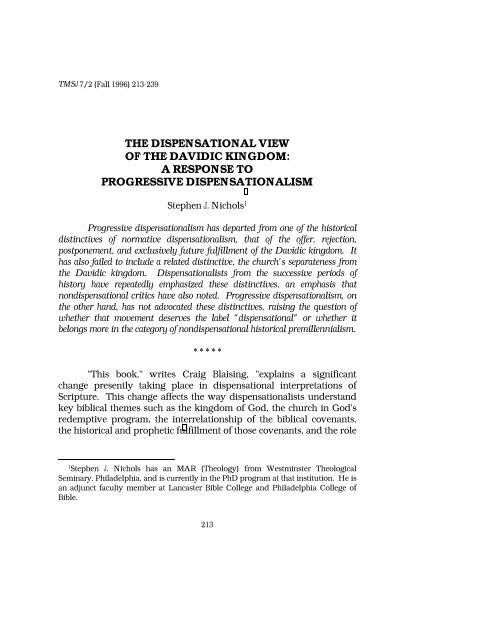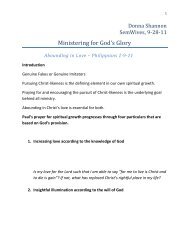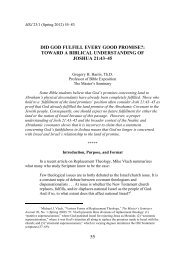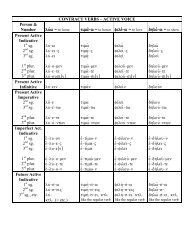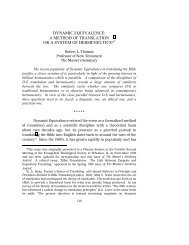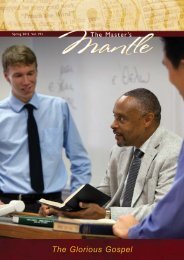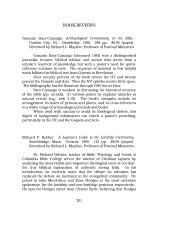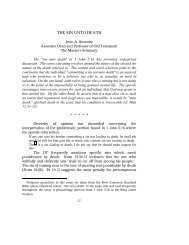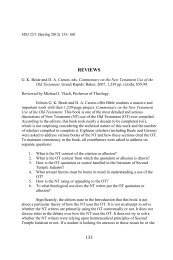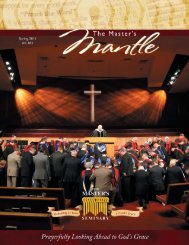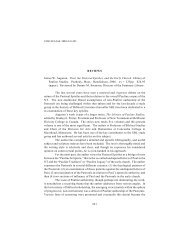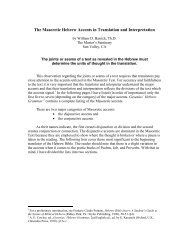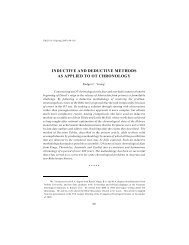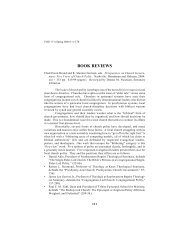The Dispensational View of the Davidic Kingdom - The Master's ...
The Dispensational View of the Davidic Kingdom - The Master's ...
The Dispensational View of the Davidic Kingdom - The Master's ...
Create successful ePaper yourself
Turn your PDF publications into a flip-book with our unique Google optimized e-Paper software.
TMSJ 7/2 (Fall 1996) 213-239THE DISPENSATIONAL VIEWOF THE DAVIDIC KINGDOM:A RESPONSE TOPROGRESSIVE DISPENSATIONALISMStephen J. Nichols 1Progressive dispensationalism has departed from one <strong>of</strong> <strong>the</strong> historicaldistinctives <strong>of</strong> normative dispensationalism, that <strong>of</strong> <strong>the</strong> <strong>of</strong>fer, rejection,postponement, and exclusively future fulfillment <strong>of</strong> <strong>the</strong> <strong>Davidic</strong> kingdom. Ithas also failed to include a related distinctive, <strong>the</strong> church's separateness from<strong>the</strong> <strong>Davidic</strong> kingdom. <strong>Dispensational</strong>ists from <strong>the</strong> successive periods <strong>of</strong>history have repeatedly emphasized <strong>the</strong>se distinctives, an emphasis thatnondispensational critics have also noted. Progressive dispensationalism, on<strong>the</strong> o<strong>the</strong>r hand, has not advocated <strong>the</strong>se distinctives, raising <strong>the</strong> question <strong>of</strong>whe<strong>the</strong>r that movement deserves <strong>the</strong> label "dispensational" or whe<strong>the</strong>r itbelongs more in <strong>the</strong> category <strong>of</strong> nondispensational historical premillennialism.* * * * *"This book," writes Craig Blaising, "explains a significantchange presently taking place in dispensational interpretations <strong>of</strong>Scripture. This change affects <strong>the</strong> way dispensationalists understandkey biblical <strong>the</strong>mes such as <strong>the</strong> kingdom <strong>of</strong> God, <strong>the</strong> church in God'sredemptive program, <strong>the</strong> interrelationship <strong>of</strong> <strong>the</strong> biblical covenants,<strong>the</strong> historical and prophetic fulfillment <strong>of</strong> those covenants, and <strong>the</strong> role1Stephen J. Nichols has an MAR (<strong>The</strong>ology) from Westminster <strong>The</strong>ologicalSeminary, Philadelphia, and is currently in <strong>the</strong> PhD program at that institution. He isan adjunct faculty member at Lancaster Bible College and Philadelphia College <strong>of</strong>Bible.213
<strong>of</strong> Christ in that fulfillment." 2 <strong>The</strong>se key biblical <strong>the</strong>mes encompassperhaps <strong>the</strong> whole <strong>of</strong> both biblical and systematic <strong>the</strong>ology, implying<strong>the</strong> extent <strong>of</strong> proposed changes by Progressive <strong>Dispensational</strong>ism(hereafter PD) as represented by Craig Blaising and his colleagueDarrell Bock. It would be a formidable task to undertake anexamination <strong>of</strong> each <strong>of</strong> <strong>the</strong>se <strong>the</strong>mes, so this essay will compare <strong>the</strong>traditional dispensational understanding <strong>of</strong> <strong>the</strong> <strong>Davidic</strong> kingdom withhow PD understands it.2Craig Blaising and Darrell Bock, Progressive <strong>Dispensational</strong>ism (Wheaton, Ill.:BridgePoint, Victor, 1993) 9.214
<strong>Dispensational</strong> <strong>View</strong> <strong>of</strong> <strong>the</strong> <strong>Davidic</strong> <strong>Kingdom</strong> 215According to Blaising, ". . . <strong>Dispensational</strong>ism has not been astatic tradition," but has undergone change and modification,especially its view <strong>of</strong> <strong>the</strong> kingdom. 3 He uses this <strong>the</strong>sis <strong>of</strong> earlierchange to legitimize current proposals <strong>of</strong> change by <strong>the</strong> progressives(i.e., progressive dispensationalists) within <strong>the</strong> dispensationaltradition. 4 This concept forms <strong>the</strong> substance <strong>of</strong> <strong>the</strong> first chapter, "<strong>The</strong>Extent and Varieties <strong>of</strong> <strong>Dispensational</strong>ism," which gives significantattention to kingdom views 5 and to <strong>the</strong> difference between classic andrevised dispensationalism. <strong>The</strong> chapter notes differences amongrevised dispensationalists in two areas: <strong>the</strong> kingdom-<strong>of</strong>-God andkingdom-<strong>of</strong>-Heaven distinction, and <strong>the</strong> relationship <strong>of</strong> <strong>the</strong> church inits present form to <strong>the</strong> kingdom. 6 <strong>The</strong> focus placed on <strong>the</strong>se twoissues, however, obscures a defining distinction <strong>of</strong> <strong>the</strong> dispensationalview <strong>of</strong> <strong>the</strong> kingdom that persists throughout <strong>the</strong> history <strong>of</strong>dispensational tradition, but is absent among <strong>the</strong> progressives. Thisdistinction is <strong>the</strong> view <strong>of</strong> <strong>the</strong> <strong>of</strong>fer, rejection, postponement, andexclusively future fulfillment <strong>of</strong> <strong>the</strong> Messianic, <strong>Davidic</strong> kingdom, and3Ibid. 21. In earlier works he argued for four such stages: (1) NiagaraPremillennialism (1875 - 1909); (2) Sc<strong>of</strong>ieldism (1909 - 1963); (3) Essentialist (1965 -1986); (4) Progressive (1986 - ) (<strong>Dispensational</strong>ism, Israel and <strong>the</strong> Church, Craig Blaisingand Darrell Bock, eds. [Grand Rapids: Zondervan, 1992] 13-34). A more recent workhas revised <strong>the</strong>se labels: (1) Classical (1800's - 1950's); (2) Revised (1950's - 1986); (3)Progressive (1986 - ). For a full discussion <strong>of</strong> <strong>the</strong>se stages and <strong>the</strong> nomenclature, seeCraig Blaising and Darrell Bock, Progressive <strong>Dispensational</strong>ism 21-23, 304-5 n. 8).4This is a similar apologetic to that found in earlier works. See <strong>the</strong> two-part articleby C. Blaising, "Doctrinal Development in Orthodoxy" and "Development <strong>of</strong><strong>Dispensational</strong>ism by Contemporary <strong>Dispensational</strong>ists," Biblio<strong>the</strong>ca Sacra 145(1988):133-40 (esp. 135), 254-80. Though this paper will focus solely on <strong>the</strong> issue <strong>of</strong><strong>the</strong> <strong>Davidic</strong> <strong>Kingdom</strong>, a similar case can be made in <strong>the</strong> area <strong>of</strong> hermeneutics. <strong>The</strong>progressives argue for far more discontinuity within <strong>the</strong> tradition than <strong>the</strong> dataallows. See Thomas D. Ice, "<strong>Dispensational</strong> Hermeneutics," Issues In <strong>Dispensational</strong>ism,Wesley Willis and John Master, eds. (Chicago: Moody, 1994) 29-49; and RobertL. Thomas, "A Critique <strong>of</strong> Progressive <strong>Dispensational</strong> Hermeneutics," When <strong>the</strong>Trumpet Sounds, Thomas Ice and Timothy Demy, eds. (Eugene, Ore.: Harvest House,1995) 413-25.5Blaising and Bock, Progressive <strong>Dispensational</strong>ism 9-56.6Ibid., 30-31, 39-46.
216 <strong>The</strong> <strong>Master's</strong> Seminary Journal<strong>the</strong> view that <strong>the</strong> church in its present form is unrelated to and distinctfrom <strong>the</strong> <strong>Davidic</strong> kingdom.This essay argues that <strong>the</strong> rejection, postponement, and entirelyfuture fulfillment <strong>of</strong> <strong>the</strong> <strong>Davidic</strong> kingdom is and has been aconsistently held view within "normative" dispensationalism. 7 Itfur<strong>the</strong>r argues that this position serves as a distinguishing feature <strong>of</strong>dispensationalism, differentiating it from non-dispensational <strong>the</strong>ology.<strong>The</strong> progressives reject this position and consequently at least blur <strong>the</strong>distinction between dispensational and non-dispensational views. 8<strong>The</strong> first section <strong>of</strong> this essay will examine <strong>the</strong> rejected/postponed<strong>Davidic</strong> kingdom view throughout <strong>the</strong> history <strong>of</strong> dispensationalism,beginning with <strong>the</strong> work <strong>of</strong> John Nelson Darby. This section will alsoexamine how non-dispensationalists note this concept withindispensationalism. <strong>The</strong> second section will assess <strong>the</strong> currentlandscape, giving attention to <strong>the</strong> rejected/postponed <strong>Davidic</strong>kingdom view in PD. Next will follow a look at <strong>the</strong> ramifications <strong>of</strong><strong>the</strong> current discussion for normative dispensationalism. However, inorder to interact with <strong>the</strong> claims <strong>of</strong> Blaising concerning whe<strong>the</strong>r <strong>the</strong>dispensational tradition <strong>of</strong> <strong>the</strong> kingdom has changed, a discussion <strong>of</strong><strong>the</strong> meanings <strong>of</strong> "development" and "change" is in order.<strong>Kingdom</strong> Distinctions in Normative <strong>Dispensational</strong>ismCharles C. Ryrie has argued for <strong>the</strong> need to distinguish between<strong>the</strong> concepts <strong>of</strong> development and change, and this is especially true interms <strong>of</strong> examining <strong>the</strong> history <strong>of</strong> doctrines and doctrinal systems. Hesums up his discussion by noting, " (1) development and change arenot synonymous but have different meanings; and (2) in order todecide whe<strong>the</strong>r something is developing or changing one must7<strong>The</strong> term "normative" follows Larry Crutchfield, <strong>The</strong> Origins <strong>of</strong> <strong>Dispensational</strong>ism:<strong>The</strong> Darby Factor (Lanham, Md.: University Press <strong>of</strong> America, 1992) 23-42. It includes<strong>the</strong> entire dispensational tradition (classic and revised), excluding <strong>the</strong> progressives.8Cf. "<strong>The</strong> essence <strong>of</strong> dispensationalism, <strong>the</strong>n, is <strong>the</strong> distinction between Israel and<strong>the</strong> Church," Charles C. Ryrie, <strong>Dispensational</strong>ism Today (Chicago: Moody, 1965) 47; cf.idem, <strong>Dispensational</strong>ism (Chicago: Moody, 1995) 41.
<strong>Dispensational</strong> <strong>View</strong> <strong>of</strong> <strong>the</strong> <strong>Davidic</strong> <strong>Kingdom</strong> 217consider what <strong>the</strong> essentials <strong>of</strong> <strong>the</strong> matter are." 9 <strong>The</strong> issue <strong>of</strong> <strong>the</strong>kingdom serves as a fitting example. Admittedly, a difference exists inviews <strong>of</strong> <strong>the</strong> substantive distinction between <strong>the</strong> phrases kingdom <strong>of</strong>God and kingdom <strong>of</strong> heaven within <strong>the</strong> dispensational tradition. 10Clarence Mason in his helpful words on this issue poses <strong>the</strong>question: "<strong>The</strong> kingdom <strong>of</strong> heaven and <strong>the</strong> kingdom <strong>of</strong> God: distinctor equated?" 11 He reflects his respect for both C. I. Sc<strong>of</strong>ield and L. S.Chafer, prefacing his critique <strong>of</strong> <strong>the</strong>ir view that <strong>the</strong> phrases <strong>the</strong>mselvesrepresent a substantive distinction. 12 He <strong>the</strong>n writes, "However, . . . Icame to <strong>the</strong> conclusion that this distinction . . . is not a validdistinction," and he proceeds to argue that <strong>the</strong> terms are usedsynonymously in Daniel and <strong>the</strong> Gospels. 13 However, in regard toroot distinctions between <strong>the</strong> phrases and <strong>the</strong> concepts underlying<strong>the</strong>m, Mason adds, "It seems to me that <strong>the</strong> simpler and better solutionis to recognize that <strong>the</strong> terms are synonymous and that <strong>the</strong> variation isdue to context, not <strong>the</strong> variant word." 14 He <strong>the</strong>n proposes <strong>the</strong>"Multiple uses <strong>of</strong> <strong>the</strong> idea (or word `kingdom') in <strong>the</strong> Bible." 15 Ryrieconcurs in reasoning that Scripture speaks <strong>of</strong> various concepts <strong>of</strong> <strong>the</strong>9Charles C. Ryrie, "Update On <strong>Dispensational</strong>ism," in Issues In <strong>Dispensational</strong>ism 16;cf. idem, <strong>Dispensational</strong>ism 161-81.10For <strong>the</strong> teaching <strong>of</strong> <strong>the</strong> distinction by earlier dispensationalists, see J. N. Darby,Collected Writings (Sunbury, Pa.: Believers Bookshelf, reprint, 1971) 25:47; C. I.Sc<strong>of</strong>ield, Sc<strong>of</strong>ield Reference Bible (Oxford: University Press, 1917) note on Matt 6:33; L.S. Chafer, Systematic <strong>The</strong>ology (Dallas: Seminary Press, 1948) 7:223-25.11Clarence Mason, Prophetic Problems with Alternate Solutions (Chicago: Moody,1973) 101.12Mason acknowledges his early dependence on <strong>the</strong> Sc<strong>of</strong>ield Reference Bible. Healso served on <strong>the</strong> revision committee for <strong>the</strong> New Sc<strong>of</strong>ield Reference Bible, (1967). Hefur<strong>the</strong>r points out how he was a member <strong>of</strong> <strong>the</strong> first class at Dallas <strong>The</strong>ologicalSeminary (<strong>the</strong>n named <strong>the</strong> Evangelical <strong>The</strong>ological College), sitting under <strong>the</strong>teaching <strong>of</strong> Chafer (ibid., 102).13Ibid., 102-3, 103-7.14Ibid., 105.15Ibid., 107.
218 <strong>The</strong> <strong>Master's</strong> Seminary Journalkingdom and that <strong>the</strong> concepts are distinguishable in <strong>the</strong> answers tothree questions: "Who is <strong>the</strong> ruler? Who are <strong>the</strong> ruled? When andwhere is <strong>the</strong> kingdom?" 16 Under this rubric, he distills four concepts:(1) <strong>the</strong> universal kingdom; (2) <strong>the</strong> <strong>Davidic</strong>/Messianic kingdom; (3) <strong>the</strong>mystery form <strong>of</strong> <strong>the</strong> kingdom; and (4) <strong>the</strong> spiritual kingdom. 17 <strong>The</strong>contributions <strong>of</strong> Mason and Ryrie (as well as those <strong>of</strong> o<strong>the</strong>rs) haveanswered <strong>the</strong> critics and advanced <strong>the</strong> view while still retaining itsessence. 18<strong>The</strong> point is that though a difference exists between earlier andlater dispensationalists, this difference is a refinement or development,not a change. <strong>The</strong> latter view retains <strong>the</strong> essence <strong>of</strong> <strong>the</strong> earlier one (i.e.,that <strong>of</strong> distinctions in <strong>the</strong> concept <strong>of</strong> <strong>the</strong> kingdom). In contrast to thisessence, however, is Blaising's view <strong>of</strong> <strong>the</strong> kingdom <strong>of</strong> God:<strong>The</strong> <strong>the</strong>me <strong>of</strong> <strong>the</strong> kingdom <strong>of</strong> God is much more unified and muchmore central to progressive dispensationalism than it is to reviseddispensationalism. Instead <strong>of</strong> dividing up <strong>the</strong> different features <strong>of</strong>redemption into self-contained `kingdoms' progressivedispensationalists see one promised eschatological kingdomwhich has both spiritual and political dimensions. 19This focus on <strong>the</strong> unity <strong>of</strong> <strong>the</strong> kingdom as opposed to distinct concepts<strong>of</strong> <strong>the</strong> kingdom is more than development; it is a change which affects<strong>the</strong> essence <strong>of</strong> dispensationalism.Blaising also points out differing views <strong>of</strong> <strong>the</strong> church'srelationship to <strong>the</strong> kingdom among revised dispensationalists. Hesurveys <strong>the</strong> work <strong>of</strong> A. McClain, C. Ryrie, J. Walvoord, and J. D.Pentecost, noting that, "<strong>The</strong> main point <strong>of</strong> this survey is to demonstrate16Charles C. Ryrie, Basic <strong>The</strong>ology (Wheaton, Ill.: Victor, 1986) 397; cf. also idem,<strong>Dispensational</strong>ism Today 169-76; idem, <strong>Dispensational</strong>ism 154-57, for a discussion on <strong>the</strong>kingdom <strong>of</strong> God and kingdom <strong>of</strong> heaven distinctions.17Ibid., 397-99.18See Mason, Prophetic Problems, 101, where he interacts with G. Ladd's critique inCrucial Questions Concerning <strong>the</strong> <strong>Kingdom</strong> <strong>of</strong> God (Grand Rapids: Eerdmans, 1952).19Blaising and Bock, Progressive <strong>Dispensational</strong>ism, 54 (cf. chart, 55).
<strong>Dispensational</strong> <strong>View</strong> <strong>of</strong> <strong>the</strong> <strong>Davidic</strong> <strong>Kingdom</strong> 219that <strong>the</strong>re is no one revised dispensational view <strong>of</strong> <strong>the</strong> kingdom." 20However, in noting <strong>the</strong> differences, he fails to acknowledge that each<strong>of</strong> <strong>the</strong> authors sees this present dispensation as different from <strong>the</strong><strong>Davidic</strong> kingdom. This omission obscures <strong>the</strong> agreement withinnormative dispensationalism in speaking <strong>of</strong> one view <strong>of</strong> <strong>the</strong> <strong>Davidic</strong>kingdom, a subject to which <strong>the</strong> present discussion now turns.<strong>The</strong> <strong>Davidic</strong> <strong>Kingdom</strong> <strong>View</strong> <strong>of</strong> Normative <strong>Dispensational</strong>ismDiscussion <strong>of</strong> <strong>the</strong> <strong>Davidic</strong> kingdom within normativedispensationalism appropriately begins with John Darby (1800-1882)and continues with Sc<strong>of</strong>ield, Chafer, Ryrie, Walvoord, McClain, andPentecost, as well as less widely known and read dispensationalists.In addition, <strong>the</strong> analysis will include <strong>the</strong> perspective <strong>of</strong> nondispensationalists(beginning with O. T. Allis and continuing withmore current works) concerning <strong>the</strong> dispensational view <strong>of</strong> <strong>the</strong><strong>Davidic</strong> kingdom.In an essay entitled, "<strong>The</strong> Church—What Is It?," Darby pointedout, "It is <strong>of</strong> great importance to distinguish between <strong>the</strong> kingdom and<strong>the</strong> church." 21 He added, "In fact, it appears to me a confusion <strong>of</strong> <strong>the</strong>Jewish and Gentile dispensations—<strong>the</strong> hinge upon which <strong>the</strong> subject[prophecy] and <strong>the</strong> understanding <strong>of</strong> scripture turns." 22 A crucialaspect <strong>of</strong> this distinction for Darby was <strong>the</strong> rejection <strong>of</strong> Christ as <strong>the</strong>Anointed, <strong>the</strong> son <strong>of</strong> David, King <strong>of</strong> Israel. 23 Commenting on Luke 3,he wrote, "In fact we know John was beheaded, and <strong>the</strong> Lord wascrucified, and <strong>the</strong> kingdom presented in Him, and by Him, wasrejected by Israel. By-and-by it will be set up visibly and in power.Meanwhile <strong>the</strong> church is set up, because <strong>the</strong> kingdom is not set up inthis manifested way." 24 Regarding Acts 2:30-36, a passage important20Ibid., 39; cf. 39-46 for a survey and charts <strong>of</strong> <strong>the</strong> views.21Darby, "<strong>The</strong> Church—What Is It?," Collected Writings 12:372.22Darby, Collected Writings 2:18.23See ibid., 5:387-88.24Ibid., 25:47. Darby refers <strong>of</strong>ten to <strong>the</strong> <strong>the</strong>me <strong>of</strong> <strong>the</strong> rejection <strong>of</strong> <strong>the</strong> King andconsequent postponement <strong>of</strong> <strong>the</strong> kingdom (11:126, 144; 30:94-95; 5:387-89).
220 <strong>The</strong> <strong>Master's</strong> Seminary Journalto <strong>the</strong> progressives, he wrote, "In this, again, <strong>the</strong>re is not one wordabout Christ's being made King," and added, "<strong>The</strong> question <strong>of</strong> <strong>the</strong>kingdom . . . was left in total abeyance." 25Though Darby may not have explicitly stated elements <strong>of</strong> <strong>the</strong><strong>of</strong>fer, rejection, postponement, and future fulfillment <strong>of</strong> <strong>the</strong> <strong>Davidic</strong>kingdom and its distinction from <strong>the</strong> church, <strong>the</strong>y were all present inhis writings. William Kelly, <strong>the</strong> editor <strong>of</strong> Darby's writings, remarkedthat Darby was like a miner who "left it to o<strong>the</strong>rs to melt <strong>the</strong> ore, andcirculate <strong>the</strong> coin." 26 Sc<strong>of</strong>ield and Chafer developed Darby's teachingsin a systematic way. 27In a book <strong>of</strong> sermons, Sc<strong>of</strong>ield wrote about God's purpose inthis age and contrasted <strong>the</strong> church as a mystery with <strong>the</strong> "kingdom tobe set up by <strong>the</strong> Messiah, David's great Son." He added,In <strong>the</strong> fullness <strong>of</strong> time John <strong>the</strong> Baptist, and <strong>the</strong>n Christ camepreaching `<strong>the</strong> kingdom <strong>of</strong> heaven is at hand.' `But His ownreceived Him not.' Israel would not have her King `meek andlowly' (Zech. ix: 9 ; Matt. xxi: 1-5), and so, when His rejection by<strong>the</strong> bulk <strong>of</strong> <strong>the</strong> nation became manifest, <strong>the</strong> kingdom waspostponed, and Christ announced <strong>the</strong> mystery, <strong>the</strong> Church. 28He repeated and expanded this idea throughout <strong>the</strong> Sc<strong>of</strong>ield ReferenceBible. 29 Blaising argued that <strong>the</strong> original edition, 1909, and <strong>the</strong> 191725Ibid., 2:76.26William Kelly, John Nelson Darby, As I knew Him (reprint, Belfast, Nor<strong>the</strong>rnIreland: Words <strong>of</strong> Truth, 1986) 11.27Larry Crutchfield <strong>of</strong>fers a thorough examination <strong>of</strong> <strong>the</strong> relationship <strong>of</strong> Darby andSc<strong>of</strong>ield in Origins <strong>of</strong> <strong>Dispensational</strong>ism: <strong>The</strong> Darby Factor (esp. 211-12). Though heallows part <strong>of</strong> Sc<strong>of</strong>ield's dispensational scheme differs from Darby's in regard to <strong>the</strong>period prior to Noah, in terms <strong>of</strong> <strong>the</strong> present issue <strong>the</strong>y agreed.28C. I. Sc<strong>of</strong>ield, Addresses on Prophecy (Greenville, S. C.: <strong>The</strong> Gospel Hour Inc., n.d.)17.29<strong>The</strong> impact <strong>of</strong> <strong>the</strong> Sc<strong>of</strong>ield Bible is readily acknowledged by many. Writing as anhistorian and sociologist, Paul Boyer notes, "For more than eighty years <strong>The</strong> Sc<strong>of</strong>ieldReference Bible has been a major conduit for disseminating premillennialdispensationalism throughout <strong>the</strong> world" (When Time Shall Be No More: Prophecy Belief
<strong>Dispensational</strong> <strong>View</strong> <strong>of</strong> <strong>the</strong> <strong>Davidic</strong> <strong>Kingdom</strong> 221edition serve as a reference point for classic dispensationalism, but <strong>the</strong>revision in 1967 (from which he derives <strong>the</strong> nomenclature "reviseddispensationalism") <strong>of</strong>fers "views much more compatible to writers <strong>of</strong>this second period [revised stage]." 30 However, though revisions <strong>of</strong>minor points occurred, <strong>the</strong> major structures and many <strong>of</strong> <strong>the</strong> key texts,especially texts <strong>of</strong> interest to this present discussion, remain intact. 31<strong>The</strong> extensive note on Acts 1:11, which is <strong>the</strong> same in <strong>the</strong> original andrevised editions, serves as an example <strong>of</strong> <strong>the</strong> many that substantiatethis point. Here Sc<strong>of</strong>ield wrote <strong>of</strong> <strong>the</strong> two advents, "In due time <strong>the</strong>Messiah born <strong>of</strong> a virgin according to Isaiah's prophecy (7:14),appeared among men and began His ministry by announcing <strong>the</strong>predicted kingdom as `near' (Mt 4:17, note 9). <strong>The</strong> rejection <strong>of</strong> Kingand kingdom followed." 32 In <strong>the</strong> same note he added that <strong>the</strong> NTteaching <strong>of</strong> <strong>the</strong> return <strong>of</strong> Christ has <strong>the</strong> following relation to Israel:"<strong>The</strong> return <strong>of</strong> <strong>the</strong> Lord to <strong>the</strong> earth is to accomplish <strong>the</strong> yet unfulfilledprophecies <strong>of</strong> Israel's national rega<strong>the</strong>ring, conversion, andestablishment in peace and power under <strong>the</strong> <strong>Davidic</strong> Covenant (2 Sam.7:16, note; cp. Acts 15:14-17 with Zech. 14:1-9)."Chafer picked up <strong>the</strong>se same emphases:Every Old Testament prophecy <strong>of</strong> <strong>the</strong> kingdom anticipates Hiskingly <strong>of</strong>fice: (a) Christ will yet sit on <strong>the</strong> <strong>Davidic</strong> throne asDavid's heir (2 Sam. 7:16; Ps. 89:20-37; Isa. 11:1-16; Jer. 33:19-21).(b) He came as a King (Luke 1:32-33). (c) He was rejected as a King(Mark 15:12-13; Luke 19:14; cf. Gen. 37:8; Ex. 2:14). (d) When Hein Modern American Culture [Cambridge, Mass.: Belknap, Harvard University Press,1992] 98).30Blaising and Bock, Progressive <strong>Dispensational</strong>ism 22.31One such revision concerns <strong>the</strong> infamous note on John 1:17; see <strong>the</strong> discussion inFred H. Klooster, "<strong>The</strong> Biblical Method <strong>of</strong> Salvation: A Case for Continuity,"Continuity and Discontinuity, John Feinberg, ed. (Westchester, Ill: Crossway Books,1988) 133. In addition, <strong>the</strong> editors have s<strong>of</strong>tened <strong>the</strong> language relating to <strong>the</strong>kingdom <strong>of</strong> heaven and kingdom <strong>of</strong> God distinction (cf. note on Matt. 3:2). However,<strong>the</strong> notes on key texts concerning <strong>the</strong> kingdom, <strong>the</strong> church, and eschatology remainsubstantially intact (cf. various notes on Matt. 13, Acts 1, and throughout Revelation).32Sc<strong>of</strong>ield, Sc<strong>of</strong>ield Reference Bible, note on Acts 1:11.
222 <strong>The</strong> <strong>Master's</strong> Seminary Journalcomes again it is as King (Rev. 19:16; cf. Luke 1:32-33). 33He fur<strong>the</strong>r emphasized <strong>the</strong> literal and earthly fulfillment <strong>of</strong> <strong>the</strong><strong>Davidic</strong> Covenant:<strong>The</strong> Covenant is <strong>of</strong> an earthly throne related to a people whoseexpectation is earthly. <strong>The</strong>re is no evidence that David foresaw anearthly throne merging into a spiritual reign; yet David was givena perfect understanding concerning <strong>the</strong> divine purpose which <strong>the</strong>covenant designated. Nor is this kingdom and throne establishedin heaven. It is established on earth when <strong>the</strong> Son <strong>of</strong> Davidreturns to <strong>the</strong> earth (Matt. 25:31, 32. Cf. 19:28; Acts 15:16; Luke1:31-33; Matt. 2:2). 34In addition, Chafer dealt at length with <strong>the</strong> <strong>the</strong>mes <strong>of</strong> <strong>the</strong> <strong>of</strong>fer,rejection and postponement <strong>of</strong> <strong>the</strong> kingdom and discussed <strong>the</strong> churchand its relation to <strong>the</strong> kingdom: "<strong>The</strong> new purpose <strong>of</strong> God in this ageis seen to be <strong>the</strong> out-calling <strong>of</strong> a heavenly people. <strong>The</strong>y form a part <strong>of</strong><strong>the</strong> kingdom in its present mystery form (Mt. xiii.); but are in no wayrelated to <strong>the</strong> Messianic earthly kingdom <strong>of</strong> Israel. . . ." 35<strong>The</strong> agreement <strong>of</strong> Chafer and Sc<strong>of</strong>ield with Darby is clear.Blaising acknowledged agreement between Chafer and Sc<strong>of</strong>ield:"Chafer's view <strong>of</strong> <strong>the</strong> kingdom was essentially <strong>the</strong> same as Sc<strong>of</strong>ield's." 36<strong>The</strong> view <strong>of</strong> <strong>the</strong> kingdom was shared by many <strong>of</strong> <strong>the</strong>ir lesser knowncontemporaries as well. 37<strong>Dispensational</strong>ists <strong>of</strong> <strong>the</strong> last half <strong>of</strong> <strong>the</strong> twentieth century show33Chafer, Systematic <strong>The</strong>ology 7:223.34L. S. Chafer, "<strong>Dispensational</strong>ism," Biblio<strong>the</strong>ca Sacra 93 (October-December1936):435.35L. S. Chafer, <strong>The</strong> <strong>Kingdom</strong> in History and Prophecy (Philadelphia: Sunday SchoolTimes, 1919) 71.36Craig Blaising, "Lewis Sperry Chafer," Handbook <strong>of</strong> Evangelical <strong>The</strong>ologians, WalterElwell, ed. (Grand Rapids: Baker, 1993) 91.37<strong>The</strong> works <strong>of</strong> W. Pettingill, J. M. Gray, W. E. Blackstone, J. H. Brookes, A. C.Gaebelein, D. G. Barnhouse, and H. A. Ironside contain similar views.
<strong>Dispensational</strong> <strong>View</strong> <strong>of</strong> <strong>the</strong> <strong>Davidic</strong> <strong>Kingdom</strong> 223continuity with <strong>the</strong> earlier dispensationalists in <strong>the</strong>ir view <strong>of</strong> <strong>the</strong>rejection, postponement, and future fulfillment <strong>of</strong> <strong>the</strong> <strong>Davidic</strong>covenant. Charles Feinberg affirmed <strong>the</strong> normative dispensationalview in his classic work, Millennialism: <strong>The</strong> Two Major <strong>View</strong>s, 38particularly in <strong>the</strong> chapter "<strong>The</strong> <strong>Kingdom</strong> Offered, Rejected, andPostponed." He argued for <strong>the</strong> church as something different from <strong>the</strong>kingdom in <strong>the</strong> chapter, "<strong>The</strong> Church Age and <strong>the</strong> Church." Hereturned to Israel and argued for a fulfillment <strong>of</strong> <strong>the</strong> <strong>Davidic</strong> kingdomin <strong>the</strong> chapter on "<strong>The</strong> Millennium." 39 In ano<strong>the</strong>r work, he <strong>of</strong>fered <strong>the</strong>following: "Again <strong>the</strong> Spirit <strong>of</strong> God alerts all with emphasis on <strong>the</strong><strong>Davidic</strong> covenant. He came to His land, His throne, and His kingdom(John 1:11)," 40 and "He <strong>of</strong>fered Himself as King (Mt. 21:1-5) and wasrejected in His kingly <strong>of</strong>fer (Jn. 18:37; 19:14-15)." 41 He <strong>the</strong>n spoke <strong>of</strong> <strong>the</strong>postponement <strong>of</strong> <strong>the</strong> kingdom:Moreover, o<strong>the</strong>r Scriptures confirm <strong>the</strong> validity <strong>of</strong> <strong>the</strong>postponement <strong>of</strong> <strong>the</strong> kingdom. . . . To <strong>the</strong> Hebrews who wereexpecting a king on David's throne, yet had rejected Him in <strong>the</strong>person <strong>of</strong> Jesus <strong>of</strong> Nazareth, <strong>the</strong> sacred writer <strong>of</strong> <strong>the</strong> Epistle to <strong>the</strong>Hebrews, emphasized <strong>the</strong> session <strong>of</strong> Christ at God's right hand(1:3; 8:1; 10:12; 12:20). With every mention <strong>the</strong> writer points outChrist as seated elsewhere than on His earthly <strong>Davidic</strong> throne. 42As mentioned above, Blaising deals at length with <strong>the</strong> kingdom<strong>the</strong>ology <strong>of</strong> McClain, Ryrie, Walvoord, and Pentecost with <strong>the</strong> purpose<strong>of</strong> highlighting <strong>the</strong>ir differences. However, <strong>the</strong> four have striking38Charles L. Feinberg, Millennialism: <strong>The</strong> Two Major <strong>View</strong>s, 3rd ed. (Chicago:Moody, 1980). <strong>The</strong> first edition <strong>of</strong> this work entitled Premillennialism or Amillennialism?appeared in 1936, so <strong>the</strong> work spans two alleged stages <strong>of</strong> dispensationalism.39Ibid., 129-43, 149-57, 181-87.40Charles Feinberg, "<strong>The</strong> Eternal Kingship <strong>of</strong> Christ," Jesus <strong>The</strong> King Is Coming,Charles Feinberg, ed. (Chicago: Moody, 1975) 186.41Ibid., 187.42Ibid., 188.
224 <strong>The</strong> <strong>Master's</strong> Seminary Journalsimilarities in <strong>the</strong>ir views on <strong>the</strong> <strong>Davidic</strong> kingdom as evidenced in <strong>the</strong>following selections.McClain introduced <strong>the</strong> term "interregnum" when he discussed<strong>the</strong> result <strong>of</strong> Christ's rejection as <strong>the</strong> Messianic King:And <strong>the</strong> Chief purpose <strong>of</strong> <strong>the</strong> new phase <strong>of</strong> teaching will be toprepare <strong>the</strong> disciples for His rejection and also for <strong>the</strong> interregnumwhich will intervene between His death and His return fromheaven in glory to establish <strong>the</strong> <strong>Kingdom</strong> on earth in accordancewith Old Testament prophecy. 43He also spoke <strong>of</strong> future fulfillment <strong>of</strong> <strong>the</strong> kingdom: "Christ alsoreassures <strong>the</strong> disciples that His impending death will not mean anyabandonment <strong>of</strong> <strong>the</strong> <strong>Kingdom</strong>; and indicates explicitly that itsestablishment will be connected with a second coming <strong>of</strong> <strong>the</strong> King." 44Ryrie <strong>of</strong>fers an explicit and lucid summary <strong>of</strong> his view <strong>of</strong> <strong>the</strong><strong>Davidic</strong> kingdom:Because <strong>the</strong> King was rejected, <strong>the</strong> Messianic, <strong>Davidic</strong> kingdomwas (from a human viewpoint) postponed. Though He neverceases to be King and, <strong>of</strong> course, is King today as always, Christ isnever designated as King <strong>of</strong> <strong>the</strong> church. . . . Though Christ is aKing today, He does not rule as King. This awaits His secondcoming. <strong>The</strong>n <strong>the</strong> <strong>Davidic</strong> kingdom will be realized (Matt. 25:31;Rev. 19:15; 20). 45Ryrie also speaks <strong>of</strong> <strong>the</strong> church's relationship to <strong>the</strong> <strong>Davidic</strong>/Messianickingdom: "<strong>The</strong> church is not a part <strong>of</strong> this kingdom at all." 46 He43Alva J. McClain, <strong>The</strong> Greatness <strong>of</strong> <strong>the</strong> <strong>Kingdom</strong> (Winona Lake, Ind.: BMH Books,1974) 321.44Ibid., 334. See also 309-20 for an extensive discussion on <strong>the</strong> rejection <strong>of</strong> <strong>the</strong>kingdom and 170-205 for a discussion <strong>of</strong> <strong>the</strong> coming and establishment <strong>of</strong> <strong>the</strong>kingdom.45Charles C. Ryrie, Basic <strong>The</strong>ology (Wheaton, Ill.: Victor, 1986) 259.46Ibid., 398-99.
<strong>Dispensational</strong> <strong>View</strong> <strong>of</strong> <strong>the</strong> <strong>Davidic</strong> <strong>Kingdom</strong> 225argues for a legitimate <strong>of</strong>fer <strong>of</strong> <strong>the</strong> <strong>Davidic</strong> kingdom and <strong>the</strong> need forits future fulfillment based on <strong>the</strong> distinction <strong>of</strong> <strong>the</strong> church from Israeland a consistently literal interpretation <strong>of</strong> Old Testament promises. 47After discussing <strong>the</strong> millennium, he sums up <strong>the</strong> dispensationalperspective by noting, "<strong>The</strong> question is whe<strong>the</strong>r <strong>the</strong> church isrecognized as a distinct purpose <strong>of</strong> God today, and whe<strong>the</strong>r or not aplace is given for <strong>the</strong> literal fulfillment <strong>of</strong> <strong>the</strong> <strong>Davidic</strong>, earthly, andspiritual kingdom in <strong>the</strong> future millennium." 48John Walvoord notes in reference to <strong>the</strong> <strong>Davidic</strong> kingdom,It is also clear that Christ is not reigning on earth in any literalsense. Jerusalem is not His capital nor are <strong>the</strong> people <strong>of</strong> Israelresponsive to His rule at <strong>the</strong> present time. To attempt to findfulfillment in <strong>the</strong> present age requires radical spiritualization anddenial <strong>of</strong> <strong>the</strong> plain, factual statements related to <strong>the</strong> kingdom. 49His numerous articles in Biblio<strong>the</strong>ca Sacra as well as a recent work, <strong>The</strong>Prophecy Knowledge Handbook, express <strong>the</strong> same understanding. In <strong>the</strong>latter he notes, "It is also abundantly clear that <strong>the</strong> church does notfulfill <strong>the</strong> promises <strong>of</strong> <strong>the</strong> kingdom on earth as given to Israel," addingthat God will "resume His plan and purpose to fulfill <strong>the</strong> kingdompromise to Israel in connection with <strong>the</strong> second coming <strong>of</strong> Christ." 50J. Dwight Pentecost discusses <strong>the</strong> eschatological implications <strong>of</strong><strong>the</strong> <strong>Davidic</strong> covenant: "David's son, <strong>the</strong> Lord Jesus Christ must returnto <strong>the</strong> earth, bodily and literally, in order to reign over David's47Ryrie, <strong>Dispensational</strong>ism Today 161-76; idem, <strong>Dispensational</strong>ism 145-60.48Ryrie, <strong>Dispensational</strong>ism Today 176; idem, <strong>Dispensational</strong>ism 158.49John F. Walvoord, Major Bible Prophecies (Grand Rapids: Zondervan, 1991) 108;cf. also idem, <strong>The</strong> Millennial <strong>Kingdom</strong> (Findlay, Ohio: Dunham, 1959) 202-7; idem,Israel in Prophecy (Grand Rapids: Zondervan, 1962.) 80-100, esp. 96-97.50John F. Walvoord, Prophecy Knowledge Handbook (Wheaton, Ill.: Victor, 1990) 438-39. See also appendices A and B concerning <strong>the</strong> fulfillment <strong>of</strong> prophecies <strong>of</strong> <strong>the</strong> Oldand New Testaments, esp. 2 Sam. 7:16 and <strong>the</strong> prophecy <strong>of</strong> David's house, kingdom,and throne to be fulfilled in <strong>the</strong> millennium (658), as well as Luke 1:32-33 and <strong>the</strong>prophecy <strong>of</strong> Christ's sitting on <strong>the</strong> <strong>Davidic</strong> throne reigning over Israel to be fulfilled in<strong>the</strong> millennium (716).
226 <strong>The</strong> <strong>Master's</strong> Seminary Journalcovenanted kingdom. <strong>The</strong> allegation that Christ is seated on <strong>the</strong>fa<strong>the</strong>r's throne reigning over a spiritual kingdom, <strong>the</strong> church, simplydoes not fulfill <strong>the</strong> promises <strong>of</strong> <strong>the</strong> covenant." 51 In a more recent work,he also speaks <strong>of</strong> <strong>the</strong> <strong>of</strong>fer, rejection, and postponement <strong>of</strong> <strong>the</strong>kingdom:In His covenant with David (2 Sam. 7:16), God promised that adescendant <strong>of</strong> David would sit on David's throne and rule over hishouse. This covenanted program was <strong>of</strong>fered to Israel, but wasrejected by <strong>the</strong> nation. Because <strong>the</strong> covenants are eternal, unconditional,and <strong>the</strong>refore irrevocable, <strong>the</strong> <strong>Davidic</strong> kingdom programwould not be canceled. It could, however, be postponed. 52He adds, "Christ's central teaching was that <strong>the</strong> <strong>Davidic</strong> kingdomwould be postponed until a future time." 53 He also discusses <strong>the</strong>church, and though he refers to it as a "new form <strong>of</strong> <strong>the</strong> kingdom," heexplicitly holds to <strong>the</strong> withdrawal and postponement <strong>of</strong> <strong>the</strong> <strong>Davidic</strong>kingdom. 54After referring to <strong>the</strong> views <strong>of</strong> Walvoord, Ryrie, and Pentecost,Blaising claims, "In response to <strong>the</strong> criticisms <strong>of</strong> George Ladd, <strong>the</strong>ydropped <strong>the</strong> kingdom distinctions <strong>of</strong> Sc<strong>of</strong>ield, modified his essentialstructure in different ways and introduced <strong>the</strong>ir own terminology. Asa result, <strong>the</strong>re is no revised dispensational kingdom <strong>the</strong>ology butcompeting interpretations which have had various levels <strong>of</strong>influence." 55 He ignores, however, <strong>the</strong> agreement among <strong>the</strong>mconcerning <strong>the</strong> postponement <strong>of</strong> <strong>the</strong> <strong>Davidic</strong> kingdom, as documentedabove, and obscures <strong>the</strong>ir agreement with each o<strong>the</strong>r and with <strong>the</strong>irpredecessors.51J. Dwight Pentecost, Things To Come (Findlay, Ohio: Dunham, 1958) 114.52J. Dwight Pentecost, Thy <strong>Kingdom</strong> Come (Wheaton, Ill.: Victor, 1990) 233.53Ibid., 234.54Ibid., 234-35.55Craig Blaising, "Contemporary <strong>Dispensational</strong>ism," Southwestern Journal <strong>of</strong><strong>The</strong>ology 36 (Spring 1994):9.
<strong>Dispensational</strong> <strong>View</strong> <strong>of</strong> <strong>the</strong> <strong>Davidic</strong> <strong>Kingdom</strong> 227O<strong>the</strong>r normative dispensationalists have also argued for asimilar understanding <strong>of</strong> <strong>the</strong> <strong>Davidic</strong> kingdom. 56 Very recently, CleonRogers has reached <strong>the</strong> following conclusion concerning <strong>the</strong> <strong>Davidic</strong>covenant:Both He [Christ] and His forerunner, John <strong>the</strong> Baptist, proclaimed<strong>the</strong> <strong>Davidic</strong> kingdom promised in <strong>the</strong> Old Testament, but thismessage was rejected. So <strong>the</strong> Messiah presented a `new' form <strong>of</strong>God's rule on <strong>the</strong> earth, <strong>the</strong> church. . . . <strong>The</strong> rejection <strong>of</strong> Israel isnot permanent, for <strong>the</strong> kingdom will be restored when <strong>the</strong> Son <strong>of</strong>David returns to set up <strong>the</strong> kingdom <strong>of</strong> David. Meanwhile Heoccupies <strong>the</strong> place <strong>of</strong> privilege and prominence, <strong>the</strong> `right hand <strong>of</strong><strong>the</strong> Fa<strong>the</strong>r,' where He rules as Head <strong>of</strong> <strong>the</strong> church and intercedesas High Priest according to <strong>the</strong> order <strong>of</strong> Melchizedek. Hisfollowers are called on to be His faithful witnesses in all <strong>the</strong> worldas <strong>the</strong>y await His return, when He will defeat all enemies, assumeHis place on <strong>the</strong> <strong>Davidic</strong> throne, and set up <strong>the</strong> <strong>Davidic</strong>kingdom. 57To underline fur<strong>the</strong>r <strong>the</strong> pervasiveness <strong>of</strong> <strong>the</strong> teaching <strong>of</strong> <strong>the</strong>rejection and postponement <strong>of</strong> <strong>the</strong> <strong>Davidic</strong> kingdom within <strong>the</strong>dispensational tradition, notice <strong>the</strong> attention given to <strong>the</strong> teaching byits critics. In 1945, O. T. Allis wrote <strong>the</strong> following about <strong>the</strong>"postponement <strong>the</strong>ory":If it be admitted that a visible earthly kingdom was promised to<strong>the</strong> Jews and announced as `at hand' by John and by Jesus, some56For example, see Renald Showers, <strong>The</strong>re Really Is a Difference: A Comparison <strong>of</strong>Covenant and <strong>Dispensational</strong> <strong>The</strong>ology (Bellmawr, N. J.: Friends <strong>of</strong> Israel GospelMinistry, 1990) esp. 97, 181-82; Herman Hoyt, <strong>The</strong> End Times (Chicago: Moody, 1969)167, 192.57Cleon Rogers, "<strong>The</strong> <strong>Davidic</strong> Covenant in Acts-Revelation," Biblio<strong>the</strong>ca Sacra 151(January-March 1994):84. See also "<strong>The</strong> <strong>Davidic</strong> Covenant in <strong>the</strong> Gospels," Biblio<strong>the</strong>caSacra 150 (October-December 1993):458-78. Also consider <strong>the</strong> following recent workby Stanley D. Toussaint, "<strong>The</strong> Contingency <strong>of</strong> <strong>the</strong> Coming <strong>of</strong> <strong>the</strong> <strong>Kingdom</strong>," Integrity<strong>of</strong> Heart, Skillfulness <strong>of</strong> Hands, Charles Dyer and Roy Zuck, eds. (Grand Rapids: Baker,1994) 222-37.
228 <strong>The</strong> <strong>Master's</strong> Seminary Journalexplanation must be found <strong>of</strong> <strong>the</strong> fact that such a kingdom was notset up. . . . <strong>The</strong> explanation which is given by <strong>Dispensational</strong>ists iscovered by <strong>the</strong> two words `rejection' and `postponement.' <strong>The</strong>kingdom was rejected by <strong>the</strong> Jews and postponed by God; and in itsplace <strong>the</strong> church was introduced. 58He added,It is <strong>the</strong> claim <strong>of</strong> all dispensationalists that <strong>the</strong> kingdom <strong>of</strong>fered <strong>the</strong>Jews by John and by Jesus was an earthly kingdom similar to that<strong>of</strong> David, <strong>the</strong> son <strong>of</strong> Jesse; and since such a kingdom was not setup at <strong>the</strong> time <strong>of</strong> <strong>the</strong> earthly ministry <strong>of</strong> Jesus, <strong>the</strong>y insist that itwas rejected by <strong>the</strong> Jews and has been postponed to a time stillfuture. 59After discussing <strong>the</strong> new form <strong>of</strong> premillennialism, i.e.dispensationalism, L. Berkh<strong>of</strong> described it thus:But when <strong>the</strong> Messiah came and <strong>of</strong>fered to establish <strong>the</strong> <strong>Kingdom</strong>,<strong>the</strong> Jews failed to show <strong>the</strong> requisite repentance. <strong>The</strong> result wasthat <strong>the</strong> King did not establish <strong>the</strong> <strong>Kingdom</strong>, but withdrew fromIsrael and went into a far country, postponing <strong>the</strong> establishment <strong>of</strong><strong>the</strong> <strong>Kingdom</strong> until His return. Before He left <strong>the</strong> earth, however,He founded <strong>the</strong> church, which has nothing in common with <strong>the</strong><strong>Kingdom</strong>, and <strong>of</strong> which <strong>the</strong> prophets never spoke. 60He discussed eschatology as he wrote <strong>of</strong> events following <strong>the</strong> raptureand tribulation: "<strong>The</strong> millennial kingdom will now be established, areal visible, terrestrial, and material kingdom <strong>of</strong> <strong>the</strong> Jews, <strong>the</strong>restoration <strong>of</strong> <strong>the</strong> <strong>the</strong>ocratic kingdom, including <strong>the</strong> re-establishment58O. T. Allis, Prophecy and <strong>the</strong> Church (Philadelphia: Presbyterian and Reformed,1945) 77.59Ibid., 70.60L. Berkh<strong>of</strong>, Systematic <strong>The</strong>ology (Grand Rapids: Eerdmans, 1953) 710.
<strong>Dispensational</strong> <strong>View</strong> <strong>of</strong> <strong>the</strong> <strong>Davidic</strong> <strong>Kingdom</strong> 229<strong>of</strong> <strong>the</strong> <strong>Davidic</strong> kingship." 61<strong>The</strong> historic premillennialist G. Ladd wrote <strong>the</strong> followingconcerning dispensationalism: "This system sees no presentrelationship between <strong>the</strong> church and <strong>the</strong> <strong>Kingdom</strong>. . . .<strong>Dispensational</strong>ists believe that <strong>the</strong> <strong>Davidic</strong> eschatological <strong>Kingdom</strong> isyet to be established with <strong>the</strong> return <strong>of</strong> Christ." 62 Clarence Bass, aformer dispensationalist, viewed <strong>the</strong> postponed kingdom as a "definitefeature <strong>of</strong> dispensationalism which distinguishes it from <strong>the</strong> historicfaith." 63 He <strong>of</strong>fered <strong>the</strong> following assessment <strong>of</strong> <strong>the</strong> view:<strong>The</strong> postponed-kingdom idea grows out <strong>of</strong> <strong>the</strong> basic concept <strong>of</strong>what <strong>the</strong> kingdom was to be, and what it shall yet be. This is heldto be a literal restoration <strong>of</strong> <strong>the</strong> national kingdom, and since nosuch covenanted kingdom with <strong>the</strong> <strong>Davidic</strong> throne has appeared,it must have been postponed. <strong>The</strong> kingdom and <strong>the</strong> church can inno way be paralleled in <strong>the</strong> plan <strong>of</strong> God. 64Anthony Hoekema also acknowledged <strong>the</strong>rejection/postponement <strong>of</strong> <strong>the</strong> kingdom as a main aspect <strong>of</strong>dispensationalism as reflected in <strong>the</strong> New Sc<strong>of</strong>ield Bible:When Christ was on earth He <strong>of</strong>fered <strong>the</strong> kingdom <strong>of</strong> heaven to<strong>the</strong> Jews <strong>of</strong> His day. This kingdom was to be an earthly rule overIsrael in fulfillment <strong>of</strong> Old Testament prophecies. . . . <strong>The</strong> Jews atthat time, however, rejected <strong>the</strong> kingdom. <strong>The</strong> final establishment<strong>of</strong> this kingdom, <strong>the</strong>refore, was now postponed until <strong>the</strong> time <strong>of</strong><strong>the</strong> millennium. 65He also characterized <strong>the</strong> postponed view as one <strong>of</strong> eight major points61Ibid., 711.62G. Ladd, "<strong>The</strong> <strong>Kingdom</strong> <strong>of</strong> God and <strong>the</strong> Church," Foundations 4 (1961):166.63Clarence Bass, Backgrounds to <strong>Dispensational</strong>ism (Grand Rapids: Baker, 1977) 32.64Ibid., 32.65Anthony Hoekema, <strong>The</strong> Bible and <strong>the</strong> Future (Grand Rapids: Eerdmans, 1979) 189.
230 <strong>The</strong> <strong>Master's</strong> Seminary Journal<strong>of</strong> dispensationalism. 66 O. Palmer Robertson also makes an extendedcomparison between dispensational and covenantal views <strong>of</strong> <strong>the</strong><strong>Davidic</strong> kingdom. He acknowledges and critiques <strong>the</strong> dispensationalnotions <strong>of</strong> <strong>the</strong> rejection, postponement, and future fulfillment in <strong>the</strong>millennium <strong>of</strong> <strong>the</strong> <strong>Davidic</strong> kingdom. 67 After arguing for <strong>the</strong> currentsession <strong>of</strong> Christ as <strong>the</strong> fulfillment <strong>of</strong> <strong>the</strong> <strong>Davidic</strong> covenant, heobserves,<strong>The</strong> dispensationalist must be commended for his desire to holdstrongly to <strong>the</strong> full veracity <strong>of</strong> Scripture in its promises. But <strong>the</strong>denial <strong>of</strong> any connection between <strong>the</strong> `throne <strong>of</strong> David' andChrist's current enthronement at God's right hand must be takenas an effort to limit <strong>the</strong> magnificent realities <strong>of</strong> <strong>the</strong> new covenantby <strong>the</strong> shadowy forms <strong>of</strong> <strong>the</strong> old. 68In a more current work, Stanley Grenz not only interacts with<strong>the</strong> normative dispensational view <strong>of</strong> <strong>the</strong> <strong>Davidic</strong> kingdom, but alsowith that <strong>of</strong> <strong>the</strong> progressives. He <strong>of</strong>fers <strong>the</strong> following perspective onclassical dispensationalism's (which for him refers todispensationalism prior to <strong>the</strong> progressives) understanding <strong>of</strong> <strong>the</strong>Israel and church distinction:<strong>The</strong> Israel phase, which began with Abraham, was suspendedwhen <strong>the</strong> Jews rejected Jesus as <strong>the</strong>ir Messiah. Consequently, <strong>the</strong>church phase, which is a paren<strong>the</strong>sis in God's Israel program, wasinaugurated at Pentecost. <strong>The</strong> advent <strong>of</strong> <strong>the</strong> church, however, didnot spell <strong>the</strong> end <strong>of</strong> God's program for Israel. God nei<strong>the</strong>rabrogated <strong>the</strong> divine promise to His Old Testament people norenmeshed <strong>the</strong>m into <strong>the</strong> church. 6966Ibid., 212-14.67O. Palmer Robertson, Christ <strong>of</strong> <strong>the</strong> Covenants (Phillipsburg, N. J.: Presbyterian andReformed, 1980) 218-27.68Ibid., 252.69Stanley Grenz, <strong>The</strong> Millennial Maze (Downers Grove, Ill.: InterVarsity, 1992) 97.See also 103-4.
<strong>Dispensational</strong> <strong>View</strong> <strong>of</strong> <strong>the</strong> <strong>Davidic</strong> <strong>Kingdom</strong> 231Throughout <strong>the</strong> history <strong>of</strong> dispensationalism its adherents andcritics alike have acknowledged one normative dispensational view <strong>of</strong><strong>the</strong> <strong>Davidic</strong> kingdom, a view that entails <strong>the</strong> <strong>of</strong>fer, rejection,postponement, and future fulfillment <strong>of</strong> <strong>the</strong> <strong>Davidic</strong> kingdom as wellas a separation <strong>of</strong> <strong>the</strong> church in its present form from this kingdom.Also, <strong>the</strong> emphasis given this view by its adherents and criticsdemonstrates <strong>the</strong> crucial role this particular element plays in <strong>the</strong>overall structure <strong>of</strong> dispensational <strong>the</strong>ology. With <strong>the</strong> history <strong>of</strong> <strong>the</strong>tradition in mind, it is appropriate next to look to <strong>the</strong> currentlandscape <strong>of</strong> <strong>the</strong> work <strong>of</strong> PD.<strong>The</strong> <strong>Davidic</strong> <strong>Kingdom</strong> <strong>View</strong> in Progressive <strong>Dispensational</strong>ismDiscussions <strong>of</strong> <strong>the</strong> <strong>of</strong>fer, rejection, and postponement <strong>of</strong> <strong>the</strong><strong>Davidic</strong> kingdom are absent in <strong>the</strong> work <strong>of</strong> <strong>the</strong> progressives. Bockargues that Luke-Acts teaches that Christ has already inaugurated Hisreign <strong>of</strong> Christ as <strong>Davidic</strong> king, that His present position <strong>of</strong> "beingseated on David's throne is linked to being seated at God's right hand," andthat a future consummative stage <strong>of</strong> <strong>the</strong> kingdom rule will follow. 70He reaches <strong>the</strong>se conclusions by approaching <strong>the</strong> text through analready-not yet framework. 71 He exhibits this method in <strong>the</strong>following:Peter establishes <strong>the</strong> <strong>Davidic</strong> connection by linking Psalm 110 toPsalm 132 and thus to 2 Samuel 7. . . . Both <strong>of</strong> <strong>the</strong>se Old Testamenttexts [Ps. 110, 16] from <strong>the</strong> Psalter are seen beyond any doubt aspresently fulfilled in <strong>the</strong> Resurrection, with Psalm 110 fulfilled atleast in terms <strong>of</strong> inauguration. Peter goes on to declare that thisLord (Jesus) sits by God's side until all enemies are a footstool for70Darrell Bock, "<strong>The</strong> Reign <strong>of</strong> <strong>the</strong> Lord Christ," <strong>Dispensational</strong>ism, Israel and <strong>the</strong>Church, Craig A. Blaising and Darrell L. Bock, eds. (Grand Rapids: Zondervan, 1992)37-67, 49.71See Blaising and Bock, Progressive <strong>Dispensational</strong>ism, 97-98, for Bock'sendorsement and explanation <strong>of</strong> his understanding <strong>of</strong> an already-not yet hermeneutic.
232 <strong>The</strong> <strong>Master's</strong> Seminary Journal<strong>the</strong> Lord's feet, something that is yet to be realized. Soinauguration is present but consummation is not. 72In an earlier critique I argued that Bock's understanding <strong>of</strong> <strong>the</strong>seconcepts and <strong>the</strong> related passages follows <strong>the</strong> work <strong>of</strong> Ladd. Consequently,a better view <strong>of</strong> PD takes it as a departure from normativedispensationalism ra<strong>the</strong>r than a fur<strong>the</strong>r development or refinement. 73Here, <strong>the</strong> purpose will not be to show PD's similarity to non-dispensationalistssuch as Ladd, but to underline its dissimilarity to normativedispensationalism. 74Bock summarizes his essay on <strong>the</strong> reign <strong>of</strong> Christ:72Ibid., 51.73Stephen J. Nichols, "Already Ladd-Not Yet <strong>Dispensational</strong>ism: D. Bock andProgressive <strong>Dispensational</strong>ism" (unpublished paper, Eastern regional meeting <strong>of</strong> <strong>the</strong>Evangelical <strong>The</strong>ological Society, Philadelphia, Pa., April 2, 1993). See also V.Poythress, Understanding <strong>Dispensational</strong>ists, 2nd ed. (Phillipsburg: Presbyterian andReformed, 1994). In this second edition, Poythress has a postscript devoted mainly to<strong>the</strong> progressives. He observes, "However, <strong>the</strong>ir position is inherently unstable. I donot think that <strong>the</strong>y will find it possible in <strong>the</strong> long run to create a safe haven<strong>the</strong>ologically between classic dispensationalism and covenant premillennialism. <strong>The</strong>forces that <strong>the</strong>ir own observations have set in motion will most likely lead tocovenantal premillennialism after <strong>the</strong> pattern <strong>of</strong> George E. Ladd" (137). Consider also<strong>the</strong> comment by Walter Elwell ("<strong>Dispensational</strong>ism <strong>of</strong> <strong>the</strong> Third Kind," ChristianityToday [September 12, 1994]:18): "<strong>The</strong> newer dispensationalism looks so much likenondispensationalist premillennialism that one struggles to see any real difference."74Bock has since argued that critics <strong>of</strong> his position have missed <strong>the</strong> crucialdifference between his already-not yet construct and that <strong>of</strong> Ladd ("CurrentMessianic Activity and OT <strong>Davidic</strong> Promise: <strong>Dispensational</strong>ism, Hermeneutics andNT Fulfillment," Trinity Journal 15 [Spring 1994]:69-70.). <strong>The</strong> area <strong>of</strong> difference lies in<strong>the</strong> view <strong>of</strong> Israel in <strong>the</strong> future stage <strong>of</strong> fulfillment. I acknowledged this point in myreview <strong>of</strong> Progressive <strong>Dispensational</strong>ism (Trinity Journal 15 [Fall 1994]:253-55), i.e., <strong>the</strong>progressive dispensational concept <strong>of</strong> <strong>the</strong> millennium is far more "Israelitish" thanthat <strong>of</strong> Ladd. However, <strong>the</strong> point still stands, that as far as <strong>the</strong> current, initial stage <strong>of</strong>fulfillment is concerned, Bock is following Ladd. He admits, "Never<strong>the</strong>less, it is truethat this complementary approach <strong>of</strong> reading Scripture means that this view <strong>of</strong> <strong>the</strong>kingdom in <strong>the</strong> present era looks very much like Ladd's" ("Current MessianicActivity," 70).
<strong>Dispensational</strong> <strong>View</strong> <strong>of</strong> <strong>the</strong> <strong>Davidic</strong> <strong>Kingdom</strong> 233In <strong>the</strong> gospel <strong>of</strong> Luke, it is clear that with Jesus' presence, andespecially his Resurrection-Ascension, comes <strong>the</strong> beginning <strong>of</strong>Jesus' kingdom rule. . . . Thus <strong>the</strong> new community, <strong>the</strong> church, is<strong>the</strong> showcase <strong>of</strong> God's present reign through Messiah Jesus, whoinaugurates <strong>the</strong> fulfillment <strong>of</strong> God's promises. 75Blaising <strong>of</strong>fers a similar understanding in his discussion <strong>of</strong> "<strong>The</strong>Church as Present Revelation <strong>of</strong> <strong>the</strong> <strong>Kingdom</strong>." 76 Throughout hislengthy treatment <strong>of</strong> <strong>the</strong> presence and coming <strong>of</strong> <strong>the</strong> eschatologicalkingdom in <strong>the</strong> person and teaching <strong>of</strong> Jesus, he has no mention <strong>of</strong> <strong>the</strong>kingdom's rejection and postponement. 77 Regarding Jesus, he writes,"Repeatedly, He is portrayed as enthroned at <strong>the</strong> right hand <strong>of</strong> God infulfillment <strong>of</strong> promises that belong to God's covenant with David. Hisenthronement and present authority is messianic." 78 He also states, "All<strong>of</strong> <strong>the</strong> language describing <strong>the</strong> church in <strong>the</strong> New Testament is ei<strong>the</strong>r directlydrawn from or is compatible with <strong>the</strong> genres <strong>of</strong> covenant promise and <strong>the</strong>Messianic kingdom." 79Blaising also discusses "some typical objections raised against<strong>the</strong> <strong>the</strong>ory <strong>of</strong> Jesus' present <strong>Davidic</strong> position and activity." 80 He lists<strong>the</strong> following objections:Objection 1. <strong>The</strong> throne Jesus received at His ascension was not <strong>the</strong>throne promised to David. . . .Objection 2. Jesus' present activity is best understood as divinesovereignty, not <strong>Davidic</strong> kingship. . . .Objection 3. To speak <strong>of</strong> <strong>the</strong> present fulfillment <strong>of</strong> <strong>Davidic</strong> promises byChrist in heaven is a spiritual interpretation <strong>of</strong> earthly, political75Bock, "<strong>The</strong> Reign <strong>of</strong> <strong>the</strong> Lord Christ" 65.76Blaising and Bock, Progressive <strong>Dispensational</strong>ism 257-62.77Cf. ibid., 232-57.78Ibid., 257.79Ibid., 260 [emphasis original].80Ibid., 182.
234 <strong>The</strong> <strong>Master's</strong> Seminary Journalpromises. 81He <strong>the</strong>n seeks to refute <strong>the</strong>se objections. A review <strong>of</strong> <strong>the</strong> normativedispensational<strong>Davidic</strong>-kingdom view as discussed above willdemonstrate how that view reflects <strong>the</strong>se objections and fur<strong>the</strong>rdemonstrates <strong>the</strong> departure <strong>of</strong> <strong>the</strong> progressives from normativedispensationalism.Robert Saucy also fails to endorse traditional dispensationalconcepts in his discussion <strong>of</strong> <strong>the</strong> <strong>Davidic</strong> covenant. 82 In this vein,Saucy writes,Traditional dispensationalists have understood this [Jesus asseated at <strong>the</strong> `right hand <strong>of</strong> God'] as teaching <strong>the</strong> present session <strong>of</strong>Christ in heaven before His return to fulfill <strong>the</strong> <strong>Davidic</strong> messianickingdom promise <strong>of</strong> a literal reign on earth. <strong>The</strong>y are careful todistinguish between <strong>the</strong> <strong>Davidic</strong> throne and <strong>the</strong> position thatChrist presently occupies in heaven at <strong>the</strong> right hand <strong>of</strong> God (Ac2:30). 83He <strong>of</strong>fers his understanding <strong>of</strong> Christ's exaltation to <strong>the</strong> right hand:"<strong>The</strong> meaning <strong>of</strong> <strong>the</strong> right hand <strong>of</strong> God in Psalm 110:1 and Acts 2:33 is,<strong>the</strong>refore, <strong>the</strong> position <strong>of</strong> messianic authority. It is <strong>the</strong> throne <strong>of</strong>David." 84 However, though arguing that Christ is on <strong>the</strong> <strong>Davidic</strong>throne, Saucy does not argue for <strong>the</strong> active reign <strong>of</strong> Christ at present.He notes that <strong>the</strong> allusion to Psalm 110 in Revelation 3:21 "affirms <strong>the</strong>present exaltation <strong>of</strong> Jesus, but not a present function <strong>of</strong> ruling." 85Saucy's view as represented here differs significantly from that <strong>of</strong>Blaising and Bock, but is still a departure from normativedispensationalism, as he observes,81Ibid., 182-87 [emphasis original].82Robert L. Saucy, <strong>The</strong> Case for Progressive <strong>Dispensational</strong>ism (Grand Rapids:Zondervan, 1993) 59-80.83Ibid., 69-70.84Ibid., 72.85Ibid., 73.
<strong>Dispensational</strong> <strong>View</strong> <strong>of</strong> <strong>the</strong> <strong>Davidic</strong> <strong>Kingdom</strong> 235This interpretation <strong>of</strong> <strong>the</strong> exaltation <strong>of</strong> Jesus to <strong>the</strong> right hand <strong>of</strong>God in fulfillment <strong>of</strong> <strong>the</strong> <strong>Davidic</strong> messianic promise <strong>the</strong>reforeallows for <strong>the</strong> inaugural fulfillment <strong>of</strong> those promises indistinction from <strong>the</strong> total postponement <strong>of</strong> <strong>the</strong> <strong>Davidic</strong> promise intraditional dispensationalism. 86While <strong>the</strong> progressive dispensationalists are careful to express<strong>the</strong>ir commitment to a future for ethnic Israel and a future, literalfulfillment <strong>of</strong> Israel's covenant promise, <strong>the</strong>se views concerning <strong>the</strong>inaugural fulfillment <strong>of</strong> Old Testament promise, especially that <strong>of</strong> <strong>the</strong><strong>Davidic</strong> covenant, and <strong>the</strong> redefining <strong>of</strong> <strong>the</strong> present form <strong>of</strong> <strong>the</strong> churchmark an aberration from normative dispensationalism. 87 <strong>The</strong> consistentlyheld <strong>of</strong>fer, rejection, postponement, and fully future fulfillment<strong>of</strong> <strong>the</strong> <strong>Davidic</strong> kingdom is absent from <strong>the</strong>ir teaching. Also absent is<strong>the</strong> view that <strong>the</strong> church is distinct from that kingdom. Ryrie <strong>of</strong>fers<strong>the</strong> following summary <strong>of</strong> <strong>the</strong> progressive dispensational teaching on<strong>the</strong> <strong>Davidic</strong> covenant, underlining its departure from normativedispensationalism:Until now <strong>the</strong> <strong>Davidic</strong> covenant was understood bydispensationalists as related only to Israel, with its ultimatefulfillment in <strong>the</strong> reign <strong>of</strong> Christ on David's throne in <strong>the</strong>Millennium. Progressive dispensationalism, however, teaches that<strong>the</strong> Lord Jesus is now reigning as David's king in heaven at <strong>the</strong>right hand <strong>of</strong> <strong>the</strong> Fa<strong>the</strong>r in an `already' fulfillment aspect <strong>of</strong> <strong>the</strong><strong>Davidic</strong> kingdom and that He will also reign on earth in <strong>the</strong>Millennium in <strong>the</strong> `not yet' aspect. <strong>The</strong>y also assert that at Christ'sascension He was inaugurated as <strong>Davidic</strong> king, that <strong>the</strong> right hand86Ibid., 76. It is also interesting to point out <strong>the</strong> synopsis <strong>of</strong> <strong>the</strong> book on its backcover: "Dr. Saucy departs from classic dispensationalism, however, in showing that(1) <strong>the</strong> fulfillment <strong>of</strong> Old Testament prophecy begins in <strong>the</strong> present church age, and(2) <strong>the</strong> church is not a paren<strong>the</strong>sis in God's program but represents a continuity with<strong>the</strong> Old Testament messianic program."87For <strong>the</strong> progressive dispensational perspective on future fulfillment, see R. Saucy,<strong>The</strong> Case for Progressive <strong>Dispensational</strong>ism 297-323; Blaising and Bock, Progressive<strong>Dispensational</strong>ism 262-77.
236 <strong>The</strong> <strong>Master's</strong> Seminary Journal<strong>of</strong> <strong>the</strong> Fa<strong>the</strong>r is <strong>the</strong> throne <strong>of</strong> David in heaven, and that <strong>the</strong> presentchurch age is indistinct from <strong>the</strong> kingdom. 88Ramifications for <strong>the</strong> <strong>Dispensational</strong> <strong>View</strong> <strong>of</strong> <strong>the</strong> <strong>Davidic</strong> <strong>Kingdom</strong>Progressive dispensationalists' view <strong>of</strong> <strong>the</strong> <strong>Davidic</strong> kingdomhas brought to <strong>the</strong> forefront some crucial aspects <strong>of</strong> dispensational<strong>the</strong>ology. Four areas in particular suggest future directions inevaluating PD and <strong>of</strong>fering critiques <strong>of</strong> normative dispensationalism. 891. Hermeneutics.A crucial aspect, though not <strong>the</strong> focus <strong>of</strong> this paper, is that <strong>of</strong>hermeneutics. On <strong>the</strong> one hand, progressives have <strong>of</strong>fered helpfulcomments about <strong>the</strong> limitations <strong>of</strong> <strong>the</strong> hermeneutical designations"literal" "normal." Bock's expansion to a "historical-grammaticalliterary-<strong>the</strong>ological"method is more complex and, consequently, ismore capable <strong>of</strong> handling <strong>the</strong> complexities faced in interpretation. 90On <strong>the</strong> o<strong>the</strong>r hand, nothing inherent in such an approach demands <strong>the</strong>employment <strong>of</strong> an already-not yet framework. 91 Fur<strong>the</strong>r, this fullermethod does not mutually exclude a `literal' interpretation. Thoseissues are beyond <strong>the</strong> scope <strong>of</strong> this essay. However, <strong>the</strong>ir mention88Ryrie, "Update on <strong>Dispensational</strong>ism" 21.89I am not suggesting that <strong>the</strong>se issues are in any way breaking new ground fordispensationalism. However, <strong>the</strong>se issues and <strong>the</strong> related texts are increasingly beingunderstood in new ways in light <strong>of</strong> <strong>the</strong> paradigm shifts occurring among progressivedispensationalists. My point is that <strong>the</strong>se issues and interpretations <strong>of</strong> <strong>the</strong> text needrethinking and developing in light <strong>of</strong> <strong>the</strong> current questions being raised.90Blaising and Bock, Progressive <strong>Dispensational</strong>ism 76-105, esp. 76-77.91Ibid., 96-100. Here Bock <strong>of</strong>fers this method as a way <strong>of</strong> relating texts, arguingthat <strong>the</strong> already-not yet tensions are evident through <strong>the</strong> Bible and serve to link "<strong>the</strong>plan <strong>of</strong> God into a unified whole" (97). However, this approach may be operating on<strong>the</strong> assumption that because x is similar to or like y, <strong>the</strong>n y has become x, or at leastincorporates x into its meaning, but actually y is simply similar to x, yet still different.<strong>The</strong> point is that even with <strong>the</strong> use <strong>of</strong> a more complex hermeneutic, <strong>the</strong>ologicalassumptions still lie behind <strong>the</strong> application <strong>of</strong> <strong>the</strong> already-not yet framework to OTpromises.
<strong>Dispensational</strong> <strong>View</strong> <strong>of</strong> <strong>the</strong> <strong>Davidic</strong> <strong>Kingdom</strong> 237here points out a need to explore hermeneutical features in moredetail.2. <strong>The</strong> Rejected/Postponed <strong>Davidic</strong>-<strong>Kingdom</strong> <strong>View</strong>.Ultimately, a commitment to being consistent with Scriptureand not tradition is <strong>the</strong> issue in <strong>the</strong> ongoing development <strong>of</strong> <strong>the</strong>ology.In this regard, <strong>the</strong> need is for a solid exegetical defense <strong>of</strong> <strong>the</strong> rejected/postponedview. A current deserving work along <strong>the</strong>se lines isthat <strong>of</strong> Cleon Rogers mentioned above. This type <strong>of</strong> work is necessaryas <strong>the</strong> progressives have demonstrated that dispensationalists can nolonger simply assume <strong>the</strong> rejected/postponed paradigm. Perhaps afruitful study would be to examine <strong>the</strong> language <strong>of</strong> fulfillment inLuke-Acts as Luke progresses from <strong>the</strong> birth narratives through <strong>the</strong>life <strong>of</strong> Christ and on to Peter's sermons. Here a study <strong>of</strong> <strong>the</strong> contrast/comparison<strong>of</strong> <strong>the</strong> introductory formulas, <strong>the</strong> content <strong>of</strong> <strong>the</strong>quotations, and <strong>the</strong> context <strong>of</strong> <strong>the</strong> passages employing <strong>the</strong> quotationslooks most promising.3. <strong>The</strong> Present Form <strong>of</strong> <strong>the</strong> Church.Ano<strong>the</strong>r area brought to <strong>the</strong> surface through <strong>the</strong> work <strong>of</strong> <strong>the</strong>progressives is <strong>the</strong> differences <strong>of</strong> opinion about <strong>the</strong> relationship <strong>of</strong> <strong>the</strong>church to <strong>the</strong> overarching concept <strong>of</strong> <strong>the</strong> universal kingdom orsovereign rule <strong>of</strong> God. Progressives and non-dispensationalists alikeare making much <strong>of</strong> <strong>the</strong>se differences and perhaps inconsistencies onbehalf <strong>of</strong> dispensationalists. A need exists for a thorough and clearexpression <strong>of</strong> <strong>the</strong> church's role as distinct from: (1) <strong>the</strong> <strong>Davidic</strong>kingdom at present (What are <strong>the</strong> implications <strong>of</strong> viewing <strong>the</strong> churchas a mystery form <strong>of</strong> <strong>the</strong> kingdom? Cf. Mat<strong>the</strong>w 13 parables.); (2) <strong>the</strong><strong>Davidic</strong> kingdom during <strong>the</strong> millennium (Is ruling with Christparticipation in <strong>the</strong> <strong>Davidic</strong> kingdom? Cf. Rev 3:21); and (3) <strong>the</strong>universal kingdom <strong>of</strong> God. Some texts relevant to this discussiondeserve significant treatment (such as Eph 1:19-23; 1 Pet 3:22; passagesin Acts and Hebrews used by <strong>the</strong> progressives.)4. <strong>The</strong> Consistent Distinction Between Israel and <strong>the</strong> Church.<strong>The</strong> rejection <strong>of</strong> <strong>the</strong> normative dispensational view <strong>of</strong> <strong>the</strong><strong>Davidic</strong> kingdom by <strong>the</strong> progressives is crucial because it impinges on<strong>the</strong> dispensational distinctive <strong>of</strong> a separation <strong>of</strong> Israel from <strong>the</strong> church.
238 <strong>The</strong> <strong>Master's</strong> Seminary JournalRyrie comments on this point:This understanding <strong>of</strong> <strong>the</strong> fulfillment <strong>of</strong> Old Testament propheciesquite naturally leads to a third feature—<strong>the</strong> clear distinctionbetween Israel and <strong>the</strong> Church which is a vital part <strong>of</strong>dispensationalism. All o<strong>the</strong>r views bring <strong>the</strong> Church into Israel'sfulfilled prophecies except dispensationalism. <strong>The</strong> amillenariansays that <strong>the</strong> Church completely fulfills Israel's prophecies, being<strong>the</strong> true, spiritual Israel. <strong>The</strong> covenant premillenarian sees <strong>the</strong>Church as fulfilling in some senses Israel's prophecies becauseboth are <strong>the</strong> people <strong>of</strong> God while at <strong>the</strong> same time preserving <strong>the</strong>millennial age as a period <strong>of</strong> fulfillment too. <strong>The</strong> understanding <strong>of</strong><strong>the</strong> how and when <strong>of</strong> <strong>the</strong> fulfillment <strong>of</strong> Israel's prophecies is indirect proportion to one's clarity <strong>of</strong> distinction between Israel and<strong>the</strong> Church. 92<strong>The</strong> similarities <strong>of</strong> <strong>the</strong> progressives to covenant premillenarians areboth obvious and telling and demonstrate <strong>the</strong> need for a consistentdistinction between <strong>the</strong> peoples <strong>of</strong> God.ConclusionFrom <strong>the</strong> perspective <strong>of</strong> dispensational tradition, <strong>the</strong> currentlandscape <strong>of</strong> progressive dispensationalists appears to be a differentterrain. <strong>The</strong> view <strong>of</strong> <strong>the</strong> <strong>of</strong>fer, rejection, postponement, and fullyfuture fulfillment <strong>of</strong> <strong>the</strong> <strong>Davidic</strong> kingdom and <strong>the</strong> corollary view <strong>of</strong><strong>the</strong> church as something different and distinct is and has been <strong>the</strong>consistent view <strong>of</strong> normative dispensationalism. By viewing <strong>the</strong>present form <strong>of</strong> <strong>the</strong> church as an inaugural stage <strong>of</strong> <strong>the</strong> <strong>Davidic</strong>kingdom with Christ seated on <strong>the</strong> <strong>Davidic</strong> throne in heaven, <strong>the</strong>progressive dispensational position has distanced itself from thisdistinguishing feature <strong>of</strong> dispensationalism. <strong>The</strong> distinguishingfeature <strong>of</strong> dispensationalism, i.e., <strong>the</strong> consistent distinction betweenIsrael and <strong>the</strong> church, is all but absent. Consequently, <strong>the</strong> legitimacy <strong>of</strong>calling PD part <strong>of</strong> <strong>the</strong> dispensational tradition is questionable.92Ryrie, <strong>Dispensational</strong>ism Today 159.


